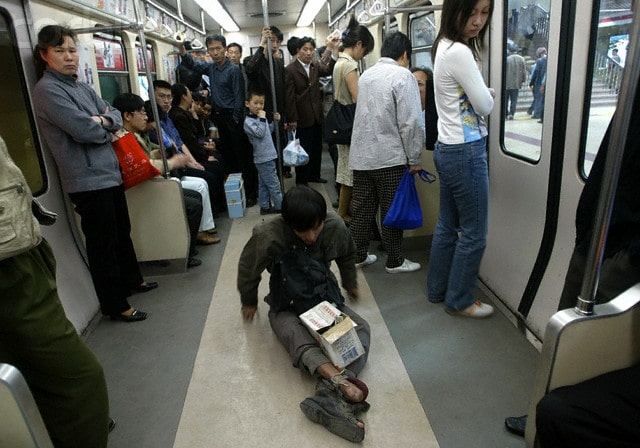Facts about China: RICH, POOR & INEQUALITY
POVERTY & RISING LIVING STANDARDS
Between 1981 and 2005, an estimated 600 million Chinese people moved out of poverty (US$1/day) and China's poverty rate dropped from 85% to 15%.
[World Bank report; Wikipedia "Poverty in People's Republic of China" ]
According to China's official statistics, between 1978 to 2007:
"¢ China's per capita rural net income increased from 133RMB to 4,140RMB.
"¢ China's per capita urban disposable income increased from 343RMB to 13,785RMB.
"¢ Per capita rural housing space increased from 8.1 to 31.6 square meters.
"¢ Per capita urban housing space increased from 4.2 to 22.6 square meters.
Between 1985 to 2007:
"¢ China's ownership of color TV per 100 families increased from 0.8 to 94.4 (rural families) and 17.2 to 137.8 (urban).
"¢ China's ownership refrigerator per 100 families increased from 0.1 to 26.1 (rural families) and 6.6 to 95 (urban).
Between 2000 to 2007, China's car ownership per 100 families increased from 0.5 to 6.06.
[ China National Bureau of Statistics, 2008; China Statistical Yearbook 2008 ]
China has more people who aspire to own a car, but currently do not, than any other country in the world, according to the research company AC Nielsen.
[BBC News "Cracking China's car market" May 17, 2007 ]
Click here for more on China's Exploding Car Culture in China Facts: TRANSPORTATION & CARS.
Only about 20% of Chinese own a credit card, according to a CCTV survey.
[ Xinhuanet News, September 14, 2007 ]
China has 38% savings rate, one of the highest in the world—due in part to the fact that there is no national safety net. Other savings rates: India (34.7%), Germany (11.7%), Britain (7%), U.S. (3.9%), Australia (2.5%).
[ Businessweek, June 10, 2010 ]
China facts: POOR & POVERTY STATISTICS
China has about 150 million people living below the United Nations poverty line of one US dollar a day.
[ Wikipedia "Income Inequality in China"; China Development Research Foundation Feb 2011 report ]
Nearly 500 million Chinese people live on less than $2 a day.
[ BBC News "Millions 'left behind' in rural China" May 12, 2010 ]
85% of China's poor live in rural areas, with about 66% concentrated in the country's west.
[China Development Research Foundation Feb 2011 report ]
99% of China's poor live in or come from rural areas, according to national statistics, which count migrant workers in cities among the rural, not urban poor. Even if migrant workers are excluded from the rural population, 90% of poverty is still rural.
[ Wall Street Journal "Facts About Poverty in China Challenge Conventional Wisdom" April 13, 2009 ]
Over half of China's population lives in rural areas"¦but they share less than 12% of the country's wealth.
[ The Telegraph UK "China's wealth gap the widest since economic reforms began" March 2, 2010 ]
Levels of poverty are higher and more severe in China's western regions, but nearly half of the poor are in other parts of the country.
[ Wall Street Journal "Facts About Poverty in China Challenge Conventional Wisdom" April 13, 2009 ]
Up to 200 million Chinese workers and peasants suffer from occupational ailments, according to data from the Ministry of Health.
[ Wall Street Journal "Rich China, Poor Peasants" July 24, 2009 ]
China facts: MIDDLE CLASS
China's middle class is estimated to between 100 million and 150 million people.
[ National Geographic, "China's Middle Class" May 2008]
China has about 55 million middle-class households, according to McKinsey & Company, which wrote: "That number could more than quadruple to nearly 280 million in 2025, to account for more than three-quarters of all China's urban households."
[ McKinsey & Co. "Comparing urbanization in China and India" July 2010 ]
China facts: GROWING INCOME INEQUALITY
China ranks #53 worst worldwide in terms of income inequality, with a Gini index (measuring wealth inequality) of 41.5. In comparison, the U.S. ranks #40 worst with a Gini index of 40.
[ CIA World Factbook, accessed March 2011 ]
In the mid-2000s, China's top 10 percent of the population controlled 45 percent of the country's wealth.
[ China's National Bureau of Statistics ]
In 2009, China's urban per capita annual income of about US$2,500 was nearly three times that of rural residents. The gap is much more extreme in larger, wealthier cities such as Beijing ($9,085 in 2008) and Shanghai ($10,529 in 2008).
[ China's National Bureau of Statistics ]
The average annual income in China's cities is now more than three times the average income in the countryside, according to the National Bureau of Statistics.
China Daily, the government-run newspaper, reported that it was the widest disparity for more than three decades.
[ The Telegraph UK "China's wealth gap the widest since economic reforms began" March 2, 2010 ]
China's poverty among ethnic minorities is two to three times higher than among the Han Chinese.
[ Wall Street Journal "Facts About Poverty in China Challenge Conventional Wisdom" April 13, 2009 ]










